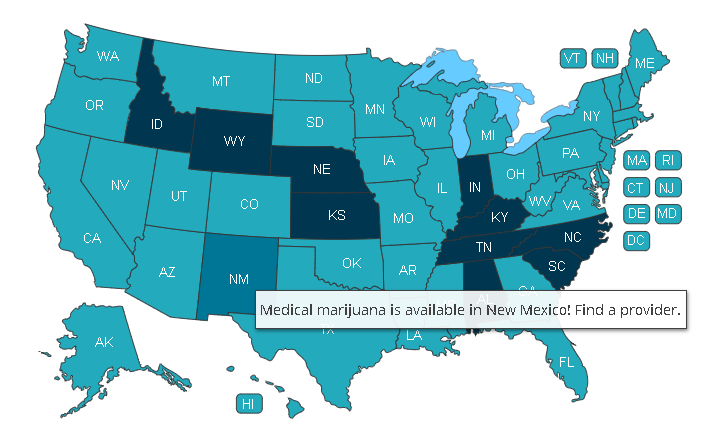
Since 2010, Marijuana Doctors has been the leading online resource for patients who want to learn about medical cannabis. While legalized medical cannabis is now available in thirty-six (36) states in America, people have significant questions about getting a medical card. And sometimes, they don’t always feel comfortable talking about medical marijuana to their primary care provider (PCP).
With more clinical studies emerging every year about the medicinal potential of cannabinoids, many people are looking at getting a medical card. Particularly if they have symptoms that impact the quality of their life, including:
Each state has a list of qualifying health conditions. The patient that wants to get a medical card will need to have at least one of the qualifying health conditions formally diagnosed. But having the health condition(s) doesn’t mean that you will be automatically approved. You will have to be evaluated and reviewed by a licensed physician or health practitioner.
If you live in a state that has legalized medical cannabis, your first step is to read the list of qualifying health conditions. Have you been diagnosed with one or more than one of them? Then you are eligible to apply for a medical marijuana card.
The next step is to find a licensed doctor or practitioner in your state to complete the health evaluation. This is an important requirement to make sure that cannabis is safe for you to use. And during the medical evaluation, the physician will review your health history, current medications, and genetic information.
The doctor may also administer a pain inventory (to measure frequency and severity of discomfort). For patients who have been diagnosed with anxiety or depression, a mental health self-evaluation or questionnaire may be provided.
Remember, the physician is not looking for reasons to deny you a medical card. The practitioner does a health evaluation and review to make sure medical marijuana is safe for you to use. Sometimes a patient may have underlying health problems that make medical marijuana less safe to use therapeutically. The physician will assess how safe cannabis may be and how effective it could help you reach your mobility, pain management, and wellness goals.
Practitioners who complete patient referrals for medical cards believe in alternative medicine. They read the research worldwide and understand that it can be a healthier, more natural way to manage symptoms. And restore quality of life.

It depends on the state where you reside. In some jurisdictions, a physician or practitioner must be trained and certified by the state medical marijuana program. Only then can they complete medical card referrals for people who want to become registered patients in the program.
In other states, however, any physician that ‘knows’ the patient (requiring multiple in-office or telemedicine visits) may be able to complete the evaluation. Some states have made telemedicine legal to conduct virtual health evaluations for patients who want a medical card.
The average renewal period for a medical cardholder in the United States is one year. However, that may be changing. For example, Oklahoma is reviewing a new law that would make it legal for non-residents of the state to get a medical card. And keep it for two years, before renewing.
Some states have reciprocal agreements, allowing you to use your medical card while traveling to another state. In order to be legally protected, the cardholder has to follow the medical cannabis laws. This can include a purchase limit (how much medical cannabis you can buy monthly) or a potency limit (i.e., maximum 30% THC content).
If you don’t renew your medical card, you can be subject to legal citations for possession of cannabis. So, it is important to make sure you are renewing your card on time. About three weeks before your card expires, to make sure it is processed correctly.
If you live in a state that has made it legal to get your health evaluation through telemedicine, you can complete it online. Simply find a physician listed on the Marijuana Doctors directory for your state. You can also choose to visit a marijuana doctor in-office. The doctor’s profile will list whether telemedicine is available or not. Or you can message the practitioner for more information.
We fully review each practitioner on our site. Other sites that list physicians do not verify the physician’s license to practice. We do. So you know you can trust the practitioner you choose on Marijuana Doctors to complete your medical cannabis recommendation.
You can try another physician. If you are declined a recommendation from a practitioner, you will not be issued a refund. However, some practices do provide a refund when the patient is denied registration with the state program. Ask the physician when you schedule your telemedicine or in-office appointment for more information on their policy.
Sometimes a patient may be approved by a physician and then declined by the state medical cannabis program. The letter of recommendation from the doctor is reviewed. But if there are any concerns about safety for the patient, you can still be declined by the medical cannabis program. And if that happens, most states have an appeals process. Your practitioner may be willing to help with your appeal.
If you have a prior felony conviction or criminal record, it may not prevent you from getting a medical marijuana card.
The age of majority in the United States is eighteen (18) years. Any adult living in a legalized state who is age 18-21 can apply for a medical card. And they do not need parental consent to get a medical card.
In states with legalized recreational (adult-use) cannabis products, you must be 21 years of age or older to visit a dispensary. If you are under 21 years and have at least one qualifying health condition, you could get your medical card in less than three weeks. Some states even issue a temporary card printed the same day you are approved as a registered patient in the marijuana program.

Minors are not permitted to visit a dispensary. That is, anyone under the age of eighteen can designate a caregiver to help them access medical marijuana for therapeutic needs. The caregiver must be over the age of twenty-one (21) years and a minor parent or legal guardian.
The caregiver must apply with the minor for a separate medical card. Once the card has been issued, the parent or guardian can legally visit a dispensary to purchase products. And the caregiver is also responsible for safely administering and storing medical marijuana.
Caregivers get their medical card. But they cannot purchase cannabis for their use. The name of the minor is printed on the card to let dispensaries know that they are authorized to purchase for the minor.
In some states where there may be few dispensaries, caregivers may also be authorized to grow a limited number of cannabis plants. Many states have added this privilege for caregivers to help economize cannabis. Home growing can be cheaper and ensure that the patient has an affordable option.
Many states limit the number of patients a caregiver can serve. In some states, however, caregivers can be registered to assist more than one patient. For example, a caregiver may also be designated to several patients receiving hospice care in an institutional setting.
Under the “Find a Doctor” page, you will see an interactive map. Simply click on your state, and you will be able to review a list of all marijuana doctors in your state. Some of the information you will want to review includes:

Click the banner to “Find a Doctor” now.
Try a new approach for symptom management with doctor-supervised therapeutic medical cannabis. Your medical card (if approved) may help.
Featured Image: VitalikRadko | Deposit Photos
No Information on MarijuanaDoctors.Com should be used to diagnose, treat, prevent or cure any disease or condition. You can view our Full Disclaimer here.